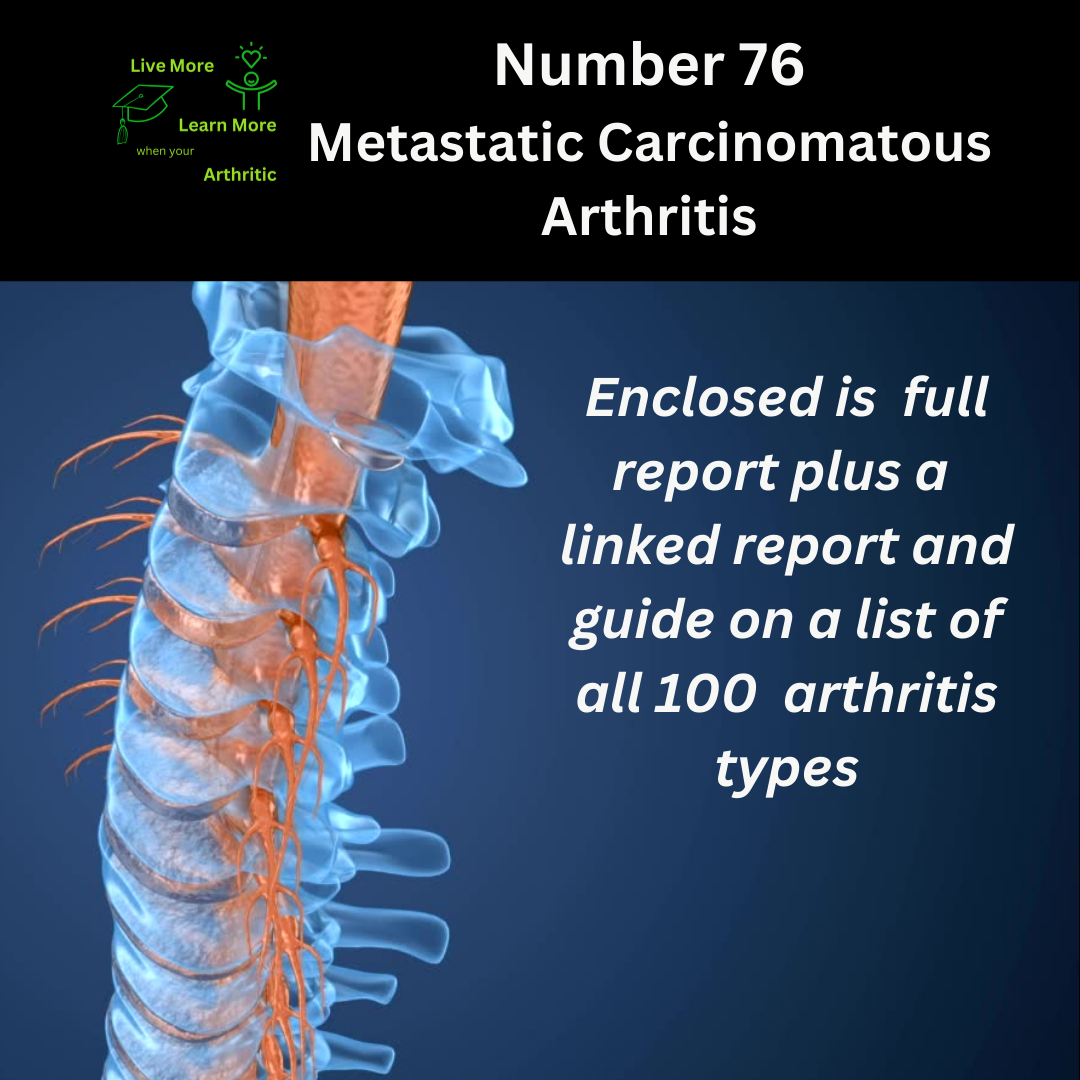
Metastatic Carcinomatous Arthritis: Number 76 on the list of 100 types of Arthritis
Metastatic carcinomatous arthritis is a rare and serious condition that occurs when cancer cells from a primary tumor metastasize (spread) to the joints, leading to inflammation and joint pain. This condition can significantly impact a person’s quality of life and requires comprehensive medical management.
 Description of Metastatic Carcinomatous Arthritis
Description of Metastatic Carcinomatous Arthritis
Metastatic carcinomatous arthritis, also known as cancer-associated arthropathy, is a type of secondary arthritis caused by the presence of cancer cells in the joint tissues. These cancer cells can infiltrate the synovium (lining of the joint), cartilage, or bone, leading to inflammation, pain, and limited mobility in the affected joint.
Causes and Triggers
The primary cause of metastatic carcinomatous arthritis is the metastasis (spread) of cancer cells from a primary tumor to the joints. Common primary tumors associated with this condition include breast cancer, lung cancer, prostate cancer, and gastrointestinal cancers. The cancer cells infiltrate the joint tissues, causing inflammation and damage.
Symptoms and Limited Range of Motion
Symptoms of metastatic carcinomatous arthritis may include:
- Persistent joint pain, often worsening over time
- Swelling and warmth around the affected joint
- Limited range of motion and stiffness
- Difficulty bearing weight on the affected joint
- Joint deformity in advanced cases
The limited range of motion is primarily due to pain, swelling, and structural changes within the joint caused by cancer infiltration.
Onset and Demographics
Metastatic carcinomatous arthritis can occur at any age but is more common in older adults, particularly those diagnosed with advanced cancer. The condition can affect both men and women, depending on the primary cancer type.
Lifespan Impact and Prognosis
The prognosis for metastatic carcinomatous arthritis depends on the underlying cancer and the extent of metastasis. This condition is often associated with advanced-stage cancer and can have a significant impact on life expectancy. The focus of treatment is typically on managing pain and improving quality of life.
Quality of Life and Proactive Approaches
Achieving a higher quality of life with metastatic carcinomatous arthritis involves a proactive and multidisciplinary approach, including:
- Pain management strategies such as medications, physical therapy, and joint injections
- Supportive care to address functional limitations and mobility issues
- Psychological support to cope with the emotional impact of cancer and arthritis
- Nutritional support to maintain strength and overall health
Complications and Associated Conditions
Complications of metastatic carcinomatous arthritis may include:
- Progressive joint destruction leading to disability
- Increased risk of fractures or joint dislocations
- Spread of cancer to other organs or tissues
- Development of secondary infections due to compromised immune function
 Natural Breakthroughs and Health Advantages
Natural Breakthroughs and Health Advantages
There are no specific natural breakthroughs associated with metastatic carcinomatous arthritis. However, maintaining a healthy lifestyle with a balanced diet, regular exercise, and stress management can support overall well-being and improve resilience during cancer treatment.
Interconnected Diseases or Conditions
Metastatic carcinomatous arthritis is closely linked to the primary cancer diagnosis and its progression. Other conditions associated with advanced cancer, such as cachexia (muscle wasting), anemia, and fatigue, can exacerbate the symptoms of arthritis and impact overall health.
In conclusion, metastatic carcinomatous arthritis is a challenging condition associated with the spread of cancer cells to the joints, leading to inflammation, pain, and functional impairment. While the prognosis is often linked to the underlying cancer, proactive management and supportive care can help improve quality of life and alleviate symptoms for individuals living with this complex and debilitating condition. Understanding the causes, symptoms, and treatment options for metastatic carcinomatous arthritis is essential for effective management and optimal patient care.

